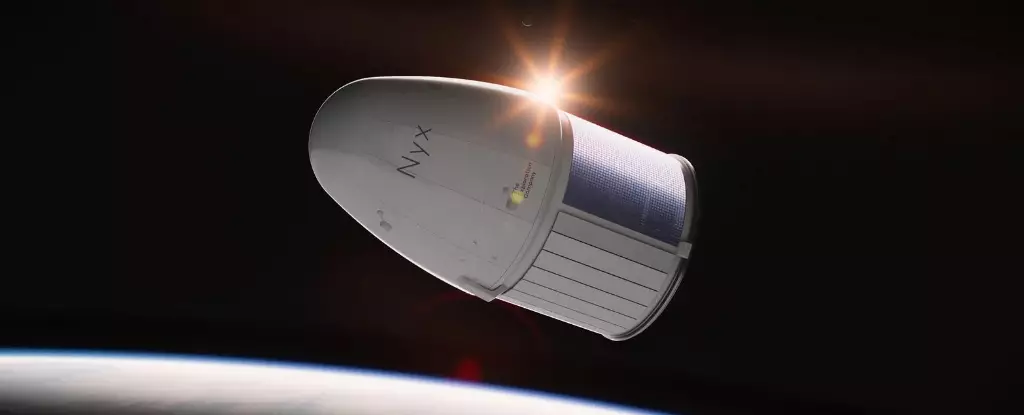The dawn of space exploration, marked by Sputnik 1’s initial launch in 1957, set humanity on a trajectory of curiosity and innovation. Over the decades, the scope of what we send into orbit has radically transformed, evolving from simple scientific instruments to complex payloads that reflect our cultural, scientific, and commercial aspirations. Today, the commercial space industry is pushing these boundaries even further, introducing an era of entrepreneurial adventure where the payloads tell stories far richer than mere scientific data. They include personal remains, biological experiments, and even unconventional cargo like cannabis seeds — a testament to how space access is democratizing and diversifying. This shift underscores a profound change: space is no longer solely the domain of nation-states but a playground for private enterprise eager to innovate, take risks, and redefine the universe of possibilities.
The Nyx Capsule: A Bold but Flawed Venture
One of the most illuminating recent examples of this new frontier is the Nyx capsule launched by The Exploration Company, a German startup aiming to carve out its niche in orbit transport. Launched from Vandenberg on a Falcon-9 during the Transporter-14 rideshare mission, Nyx’s payload was emblematic of this ambitious era. It carried not only human cremated remains and DNA but also biological experiments involving cannabis seeds, intended to study how microgravity impacts plant germination and resilience—an intriguing step toward future space agriculture and colonization. The inclusion of personal ashes, particularly more than 166 people’s remains, raises essential questions about how we memorialize our loved ones in an age of expanding space access.
However, this mission also exposed the harsh realities of operating on the cutting edge. Despite a successful launch and nominal in-orbit operation, Nyx experienced a critical failure during reentry—the parachutes failed to deploy, leading to a crash in the Pacific and the loss of invaluable cargo. While the mission was labeled a “partial success” by the company, the event serves as a stark reminder that technological innovation in space is fraught with risks. Every step forward is accompanied by the potential for setbacks that can entail significant financial, emotional, and reputational costs. This incident exemplifies the brutal truth: pushing the boundaries of what’s technically possible demands resilience and a willingness to accept failure as part of the process.
Autonomy, Commercial Risks, and Ethical Dilemmas
The loss of the Nyx capsule is not just a technical hiccup; it raises deeper questions about the nature of commercial space endeavors and their ethical implications. When companies launch human remains, biological samples, or even controversial cargo like cannabis seeds into space, they are entering uncharted moral territory. The space industry is stepping into an arena where the legal and ethical frameworks are still evolving. The grieving families affected by the loss of loved ones’ remains deserve transparency and accountability, yet the nascent commercial space industry often operates in a regulatory gray area.
Moreover, the pursuit of innovation at such heights demands robust safety protocols and risk management strategies. The challenge is balancing the desire to explore and develop new technologies with the imperative to protect human interests and the environment. The failure of Nyx’s parachutes highlights an ongoing need for rigorous testing, redundancy, and perhaps most crucially, humility. The excitement of claiming new milestones can blind us to the perils inherent in spaceflight, which is unforgiving. Every crash, every lost cargo, forces the industry to reckon with the trade-off: how much risk is acceptable when dealing with both valuable payloads and human dignity?
The Future of Space Cargo and Human Curiosity
Looking ahead, the ambitions of companies like The Exploration Company signal a promising, albeit volatile, future. They aim to demonstrate that cargo—be it scientific experiments, personal remains, or bio-materials—can be reliably transported to destinations like the International Space Station and beyond. The planned demonstration flight to the ISS in 2028, contingent on European support, exemplifies this ambition. The goal is to develop scalable, cost-effective transportation methods that will eventually enable routine cargo missions in low Earth orbit.
Yet, the path forward must be navigated with pragmatic caution. Spacecraft and payload technologies need to evolve beyond experimental prototypes to mature systems with proven reliability. The recent setbacks underscore that innovation in this domain can never be hurried at the expense of safety and foresight. Successful integration of these new commercial ventures into the broader space ecosystem depends on establishing rigorous standards, enhancing safety protocols, and, importantly, sustaining trust among all stakeholders—companies, regulatory authorities, and the public.
As space becomes a marketplace for diverse, unconventional payloads, society must confront how we assign value, meaning, and ownership in the vast expanse beyond Earth. Will we commodify human remains as mere cargo, or will we honor their significance in a cosmic context? The answers will shape how future generations perceive humanity’s journey into the stars—not just as explorers but as ethical beings responsible for the footprints we leave in the universe.

